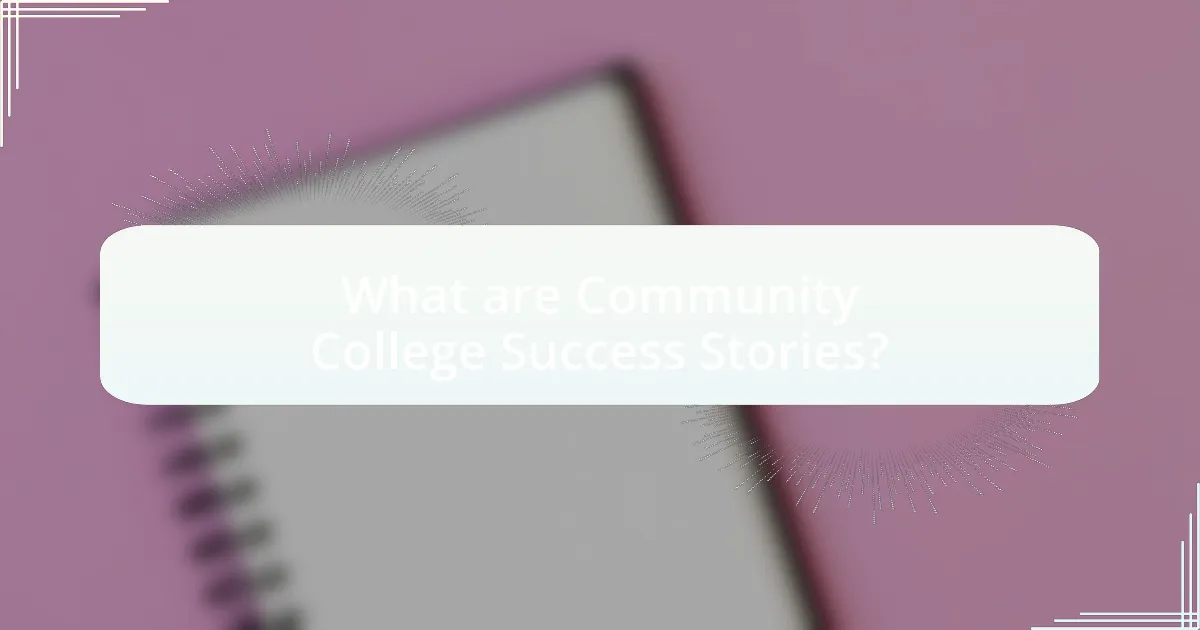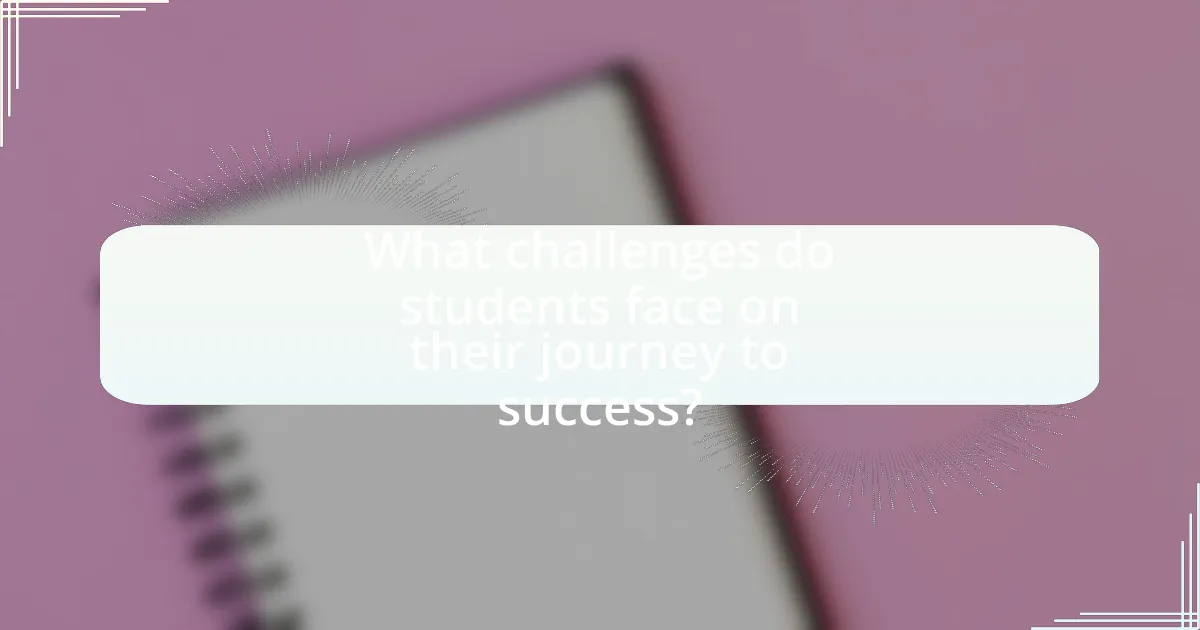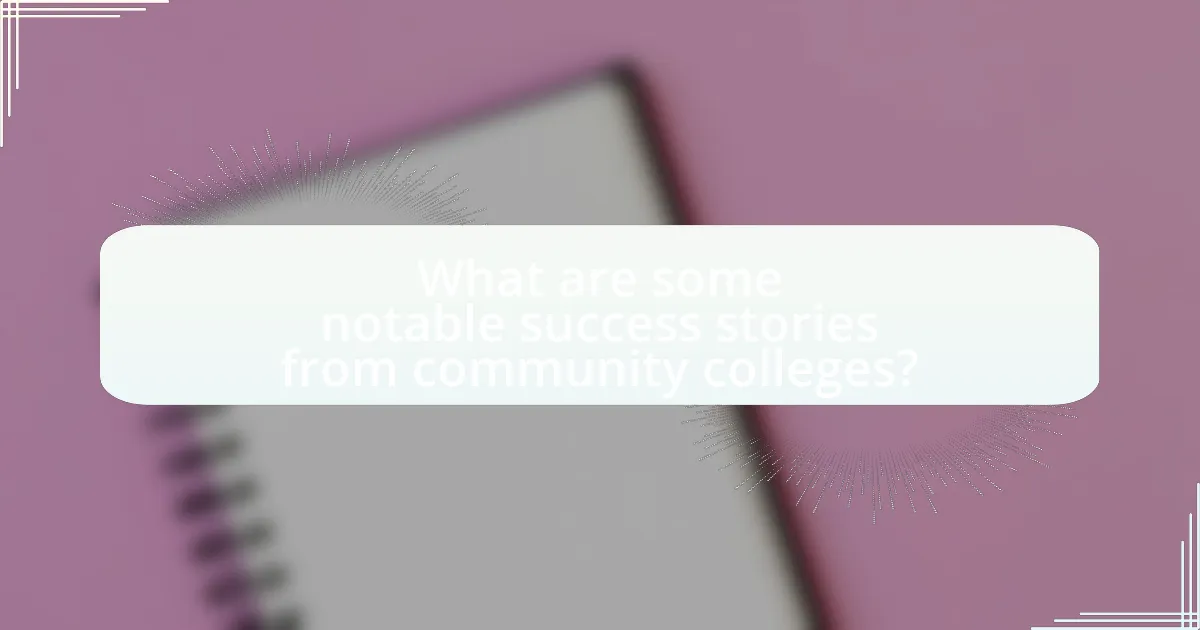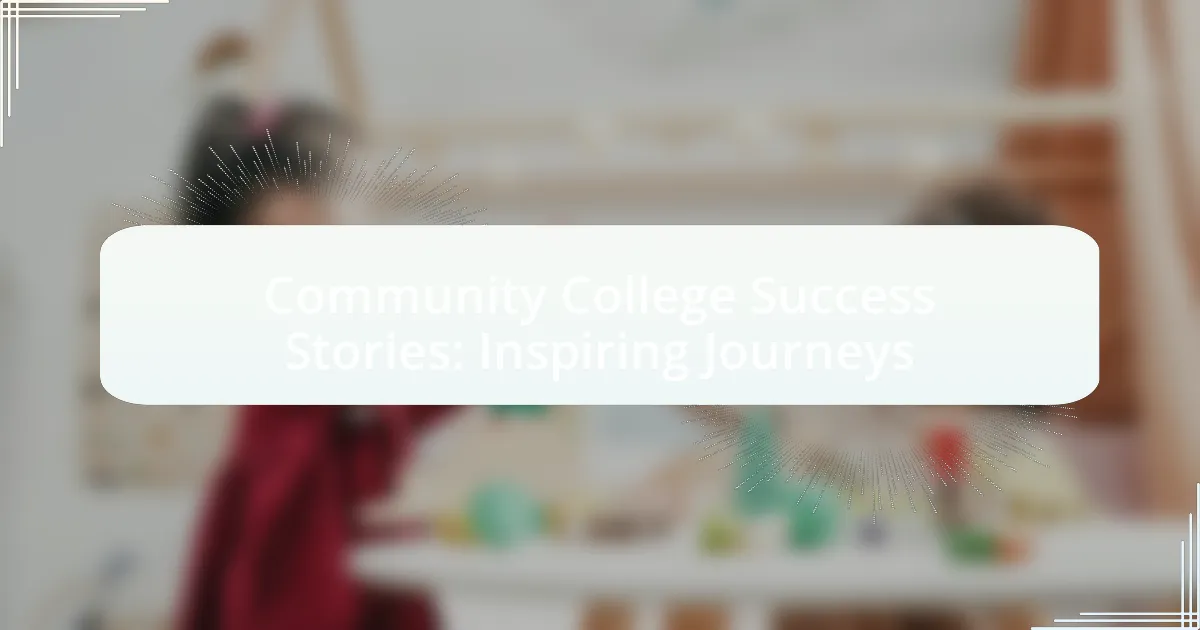Community college success stories highlight the transformative impact of education on individuals who have overcome personal challenges to achieve academic and career advancements. These narratives often feature first-generation college students and emphasize themes of resilience, determination, and the importance of accessible education. The article explores how community colleges support diverse populations, the challenges students face, and notable success stories that illustrate the potential for personal and professional growth. Additionally, it discusses the resources available to help students navigate financial barriers and manage work-life balance, as well as best practices for fostering success within these institutions.

What are Community College Success Stories?
Community college success stories are narratives that highlight the achievements of individuals who have transformed their lives through education at community colleges. These stories often showcase students overcoming personal challenges, such as financial hardships or family responsibilities, to attain degrees or certifications that lead to better job opportunities. For instance, a report from the American Association of Community Colleges indicates that nearly 40% of community college students are first-generation college students, many of whom go on to achieve significant career advancements and contribute positively to their communities. These success stories serve as powerful testimonials to the impact of accessible education on personal and professional growth.
How do these stories inspire others?
Community college success stories inspire others by showcasing resilience and achievement in the face of adversity. These narratives highlight individuals who have overcome personal and academic challenges, demonstrating that education is accessible and transformative. For instance, a study by the American Association of Community Colleges found that 70% of community college graduates reported improved job prospects and personal growth, reinforcing the idea that such stories can motivate others to pursue their educational goals. By sharing their journeys, these individuals serve as relatable role models, encouraging others to believe in their potential and take actionable steps toward their own success.
What common themes emerge in these success stories?
Common themes in community college success stories include resilience, determination, and the transformative power of education. Many individuals highlight their ability to overcome personal and financial challenges, demonstrating resilience in pursuing their academic goals. Determination is often evident as students balance work, family, and studies, showcasing their commitment to achieving a better future. Additionally, the transformative power of education is frequently emphasized, with graduates reporting improved job prospects and personal growth as a direct result of their community college experience. These themes collectively illustrate the significant impact that community colleges have on individuals and their communities.
How do personal backgrounds influence these journeys?
Personal backgrounds significantly influence journeys in community college success stories by shaping individuals’ motivations, challenges, and support systems. For instance, students from low-income families often face financial barriers that can impact their educational choices and persistence, while those with supportive family structures may experience enhanced encouragement and resources, leading to higher success rates. Research indicates that first-generation college students, who often lack familial guidance in navigating higher education, may encounter unique obstacles but also demonstrate resilience and determination, which can ultimately contribute to their success. These factors illustrate how diverse personal backgrounds create varied pathways and experiences in the pursuit of educational goals.
Why are community colleges important in these success narratives?
Community colleges are important in success narratives because they provide accessible education and training opportunities that empower individuals to achieve their academic and career goals. These institutions often serve diverse populations, including low-income students and those seeking to improve their skills, which is evidenced by the fact that nearly 40% of all undergraduate students in the United States are enrolled in community colleges. Additionally, community colleges offer flexible schedules and lower tuition costs, making higher education more attainable. This accessibility contributes to increased graduation rates and successful transitions to four-year universities or the workforce, as seen in studies showing that community college graduates earn higher wages compared to those without postsecondary education.
What role do community colleges play in career advancement?
Community colleges play a crucial role in career advancement by providing accessible education and training that aligns with workforce needs. They offer a variety of programs, including associate degrees, certificates, and vocational training, which equip students with practical skills sought by employers. According to the American Association of Community Colleges, nearly 80% of community college students are enrolled in programs that lead directly to employment, highlighting their effectiveness in facilitating job readiness. Additionally, community colleges often have partnerships with local businesses, ensuring that the curriculum is relevant and responsive to industry demands, further enhancing students’ employability.
How do community colleges support diverse student populations?
Community colleges support diverse student populations by offering tailored programs and services that address the unique needs of various groups. These institutions provide financial aid options, such as scholarships and grants, which help reduce barriers to access for low-income students. Additionally, community colleges often implement culturally relevant curricula and support services, including tutoring, counseling, and mentorship programs, which cater to the diverse backgrounds of their students. For instance, according to the American Association of Community Colleges, over 50% of community college students are from minority backgrounds, highlighting the importance of these targeted initiatives in fostering an inclusive educational environment.

What challenges do students face on their journey to success?
Students face several challenges on their journey to success, including financial constraints, time management issues, and academic pressures. Financial constraints often lead to stress, as many students juggle tuition fees, living expenses, and part-time jobs. According to the National Center for Education Statistics, nearly 60% of community college students work while enrolled, which can hinder their academic performance. Time management issues arise from balancing coursework, work commitments, and personal responsibilities, making it difficult for students to allocate sufficient time for studying and completing assignments. Additionally, academic pressures, such as maintaining a certain GPA or preparing for exams, can lead to anxiety and burnout. These challenges collectively impact students’ ability to succeed in their educational pursuits.
How do financial barriers impact student success?
Financial barriers significantly hinder student success by limiting access to educational resources and opportunities. Students facing financial constraints often struggle to afford tuition, textbooks, and necessary technology, which can lead to increased dropout rates. According to a report by the National Center for Education Statistics, students from low-income backgrounds are more likely to leave college without a degree compared to their higher-income peers. Additionally, financial stress can negatively affect academic performance, as students may need to work multiple jobs, reducing their study time and focus on coursework. This cycle of financial hardship and academic struggle illustrates the profound impact that financial barriers have on student success.
What resources are available to help overcome financial challenges?
Resources available to help overcome financial challenges include scholarships, grants, financial aid programs, and community support services. Scholarships and grants, such as those offered by the Federal Pell Grant program, provide funds that do not need to be repaid, assisting students in covering tuition and other educational expenses. Financial aid programs, including federal student loans and work-study opportunities, offer additional financial support tailored to individual needs. Community support services, such as local non-profits and educational institutions, often provide resources like financial literacy workshops and emergency funds to help individuals navigate financial difficulties. These resources collectively aim to alleviate the financial burden on students and promote their academic success.
How do students manage work-life balance while studying?
Students manage work-life balance while studying by implementing effective time management strategies and prioritizing tasks. For instance, many students create structured schedules that allocate specific time blocks for studying, work, and personal activities, which helps them maintain a clear boundary between academic responsibilities and personal life. Research indicates that students who utilize tools like planners or digital calendars report higher satisfaction in balancing their commitments. Additionally, engaging in self-care practices, such as exercise and social activities, further supports their ability to manage stress and maintain focus on their studies.
What academic challenges do community college students encounter?
Community college students encounter several academic challenges, including inadequate preparation for college-level coursework, balancing work and study commitments, and limited access to academic resources. Research indicates that many community college students come from diverse educational backgrounds, which can lead to gaps in foundational skills necessary for success in higher education. For instance, a study by the Community College Research Center found that approximately 60% of community college students require remedial education in subjects like math and English, indicating a significant challenge in meeting academic standards. Additionally, many students juggle part-time or full-time jobs alongside their studies, which can hinder their ability to dedicate sufficient time to coursework and study. Limited access to tutoring, advising, and library resources further exacerbates these challenges, making it difficult for students to achieve their academic goals.
How do students adapt to different learning environments?
Students adapt to different learning environments by employing various strategies such as flexibility in learning styles, effective time management, and seeking support from peers and instructors. Research indicates that students who actively engage with their environment, such as participating in group discussions or utilizing available resources, tend to perform better academically. For instance, a study published in the Journal of Educational Psychology found that students who adapted their study habits to fit the demands of their learning environment showed a 20% increase in academic performance compared to those who did not. This adaptability is crucial in community college settings, where diverse learning environments often require students to navigate both traditional and non-traditional educational approaches.
What support systems are in place to assist struggling students?
Support systems for struggling students include academic advising, tutoring services, mental health counseling, and financial aid resources. Academic advising helps students navigate their educational paths and make informed decisions about course selections. Tutoring services provide personalized assistance in various subjects, enhancing understanding and performance. Mental health counseling offers emotional support and coping strategies, addressing issues that may hinder academic success. Financial aid resources assist students in managing tuition and living expenses, ensuring they can focus on their studies. These systems collectively contribute to improved retention rates and academic performance among community college students.

What are some notable success stories from community colleges?
Notable success stories from community colleges include individuals like Dr. John W. McCarty, who started at a community college and went on to earn a Ph.D. in education, eventually becoming a college president. Another example is the story of Maria Contreras-Sweet, who attended a community college before becoming the Administrator of the Small Business Administration under President Obama. These success stories illustrate the transformative impact of community colleges, as they provide accessible education that enables students to achieve higher education and career advancement. According to the American Association of Community Colleges, nearly 40% of all U.S. undergraduates are enrolled in community colleges, highlighting their role in fostering educational success.
Who are some inspiring individuals who have succeeded through community colleges?
Notable individuals who have succeeded through community colleges include former U.S. President Bill Clinton, who attended the University of Arkansas Community College at Hope, and actress and producer Octavia Spencer, who studied at the Alabama School of Fine Arts before transferring to Auburn University after community college. Additionally, author and motivational speaker Liz Murray, who overcame homelessness, attended community college and later graduated from Harvard University. These examples illustrate the potential for community colleges to serve as a stepping stone to greater achievements.
What specific achievements have these individuals accomplished?
Individuals featured in “Community College Success Stories: Inspiring Journeys” have accomplished significant milestones, including earning degrees, transferring to four-year universities, and achieving career advancements. For instance, one individual graduated with honors and secured a scholarship to a prestigious university, while another successfully transitioned into a managerial role within their company after completing a vocational program. These achievements demonstrate the transformative impact of community college education on personal and professional development.
How have their experiences shaped their future careers?
Their experiences have significantly shaped their future careers by providing practical skills, networking opportunities, and personal growth. Community college programs often emphasize hands-on learning and real-world applications, which equip students with relevant competencies sought by employers. For instance, many graduates report that internships and collaborative projects during their studies directly led to job offers in their fields. Additionally, the diverse environments of community colleges foster resilience and adaptability, traits that are crucial in today’s dynamic job market. Studies indicate that community college graduates experience higher employment rates and increased earning potential compared to those without post-secondary education, underscoring the transformative impact of their educational experiences on career trajectories.
What lessons can be learned from these success stories?
Lessons learned from community college success stories include the importance of resilience, the value of support systems, and the impact of goal-setting. Resilience is crucial as many individuals face challenges but persist to achieve their educational goals, demonstrating that overcoming obstacles is possible. Support systems, such as mentors and community resources, play a significant role in providing guidance and encouragement, which enhances student success rates. Additionally, effective goal-setting helps students maintain focus and motivation, leading to higher completion rates. For instance, studies show that students who set specific academic goals are more likely to graduate, highlighting the effectiveness of this strategy in achieving success.
How can other students apply these lessons to their own journeys?
Other students can apply the lessons from community college success stories by actively engaging in their educational environment and seeking support from peers and mentors. For instance, many successful students emphasize the importance of building a network, which can provide guidance and motivation. Research shows that students who participate in study groups or mentorship programs are more likely to achieve academic success, as these interactions foster collaboration and accountability. Additionally, embracing a growth mindset, as highlighted in various success narratives, encourages students to view challenges as opportunities for learning, ultimately enhancing their resilience and adaptability in their academic journeys.
What best practices can community colleges adopt to foster success?
Community colleges can adopt several best practices to foster success, including implementing comprehensive academic advising, enhancing student support services, and promoting active learning strategies. Comprehensive academic advising ensures that students receive personalized guidance, which has been shown to improve retention rates; for instance, a study by the National Academic Advising Association found that effective advising can increase student persistence by up to 20%. Enhancing student support services, such as tutoring and mental health resources, addresses diverse student needs, contributing to higher graduation rates. Additionally, promoting active learning strategies, such as collaborative projects and experiential learning, engages students more effectively, leading to improved academic outcomes, as evidenced by research from the American Association of Community Colleges, which highlights that active learning can increase student performance by 50%.
What practical tips can help students succeed in community college?
To succeed in community college, students should prioritize time management, actively engage in classes, and utilize campus resources. Effective time management allows students to balance coursework, work, and personal commitments, which is crucial given that 70% of community college students work while studying. Active engagement in classes, such as participating in discussions and seeking clarification, enhances understanding and retention of material. Additionally, utilizing campus resources like tutoring centers, academic advising, and counseling services can provide essential support, as studies show that students who seek help are more likely to succeed academically.

Leave a Reply